World Music Center Distinguished Scholar Series
Decolonizing a British Museum’s Musical Instrument Collection: First Steps
Lecture by Margaret Birley
Margaret Birley was formerly Principal Curator of Musical Collections and Cultures at the Horniman Museum in London, England, where she was responsible for the interpretation of the musical instrument collection and its development. She played a critical role in the acquisition of a number of the Horniman’s substantial musical instrument collections during her 38 years of work at the museum, including the Wayne collection of 600 concertinas and related free reed instruments. With training in ethnomusicology, her research into the museum’s Asian musical instrument collection led her to make collections for the Horniman in Uzbekistan and India, and she also commissioned modern examples of traditional musical instruments in Belarus, filming performance in them there. She was lead curator responsible for selecting the instruments and devising the interpretation for the Museum’s Music Gallery of over 1,300 objects and for a major temporary exhibition of instruments collected from rural areas of India, as well as for smaller exhibitions in the museum and in other UK venues. She has helped to deliver projects exploring the heritage of historic instruments from Africa and Asia, working with London-based community groups. From 2009 to 2011 she chaired a consortium of European musical instrument museums in their work to update the Hornbostel Sachs classification of musical instruments, part of the MIMO project funded by the European Union. From 2020 to 2022 she chaired Music in the Making, the Horniman’s programme to improve the understanding of the museum’s musical instrument collection and to maximise its potential through
creative programming.
The imperatives for the work of museums arising from the central aims of the ‘Black Lives Matter’ movement have informed discussion and debate in these organizations in Britain in recent years. Underpinning many of the initiatives for action are the guidelines in the UK’s Museums Association’s A Decolonising Toolkit for Museums. The need for these guidelines is a reflection of the increasing pressure on museums in Britain to act on the implications of their having been founded by individuals who inherited their wealth and obtained their some of their collections through colonial exploitation and violence. Many such collections are housed in museums established at a time when the British empire dominated world trade and over 20% of the global population. Britain’s hegemony facilitated the realization of the aims of British collectors seeking to acquire material from countries under British rule. Among these collectors was the tea-merchant, Frederick Horniman (1835-1906) who dedicated his free museum and his collections to the people of London for their ‘recreation, instruction and enjoyment’ in 1901. It houses a collection of musical instruments that now numbers over 9,500 examples representing many of the world’s musical traditions. Discourse around the museum’s instruments, once celebratory, is now qualified by anxiety. The steps that the Horniman Museum has so far taken towards the decolonization of its collections, and their musical outcomes, will be discussed in the presentation.



